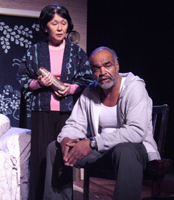
Paulanne Simmons
"Yohen" Finds Beauty in Imperfection
 |
| David Fonteno and Dian Kobayashi. Photo by Corky Lee. |
"Yohen"
Directed by Seret Scott
Pan Asian Repertory at
West End Theatre
263 West 86th St. between Broadway and West End Ave.
Opened Oct. 18, 2006
Wed. thru Sat. 8 p.m., matinees Sat. & Sun. 3 p.m.
$40 (212) 868-4030
Closes Nov. 5, 2006
Reviewed by Paulanne Simmons Oct. 21, 2006
In Japanese, the word "yohen" is a pottery term for an accident in the kiln producing a flaw in the coloration that may be ugly or beautiful, depending on how the viewer looks at it. In Philip Kan Gotanda’s "Yohen," making its East Coast premiere at Pan Asian Repertory, the damaged object seems to the marriage of James (David Fonteno), an African American ex-GI and his Japanese wife, Sumi (Dian Kobayashi).
The couple has been married thirty years. Their home is a comfortable southern California apartment decorated with many Japanese objects. (The set is by Charlie Corcoran). Sumi is a secretary and James is retired. The back story is enormous. In fact it is pretty much the entire play.
For some reason (a growing dissatisfaction, mid-life crisis, last-chance syndrome?), Sumi has decided she wants James out of the house but not out of her life. His mission, which he tries to accomplish during the first 40 or so minutes of the play, is to woo her back by pretending they have just met and he is courting her with candy and flowers.
Urged by Sumi to find something significant to do with his considerable leisure time, James devotes himself to training underprivileged boys in the art of boxing. But Sumi finds this new occupation even worse than doing nothing. As he gets more involved with the kids they draw further apart. That’s the second forty minutes of the play.
As the play evolves, Sumi and James reveal the problems that have plagued their marriage ever since they returned to the United States after leaving Japan, where James met Sumi after World War II. The issues that divide them are myriad: Sumi is interested in art and education; James is interested in boxing and television. Sumi likes to serve tea; James likes to drink beer.
Most important, James wanted children; Sumi didn’t. It turns out the reason Sumi wanted to remain childless was her fear that the child, being half-black, would be looked down on by both American and Japanese society. She says it was a matter of pride; he thinks it smacks of racism. In what is perhaps the most dramatic scene of the play, Sumi suggests they adopt a Japanese child. He dismisses the idea because they are too old and also because he doesn’t want a Japanese child.
"Yohen" is directed with great sensitivity by Seret Scott. What’s more, Kobayashi and Fonteno gamely plough through endless dialogue and do it with humor and confidence. Gotanda’s rambling, unfocussed script has been well-served.
Thanks to director and actors, it’s possible at times to forget that most of what is revealed in "Yohen" should be old-hat after thirty years, that married couples seldom discuss in great detail events that happened thirty years ago, and that without some compelling reason (never produced in "Yohen,") it’s hard to understand why such an ill-suited (and childless) couple stayed together for so many years after the first blush of love must have faded.
In fact, this reviewer must confess, that for some reason, despite all reason, she actually liked the play in many ways.
It just may be that, unbeknownst to the author, "yohen" really applies to the play itself. A deeply flawed work of art that somehow has beauty because of or in spite of its imperfections.
| lobby | search
| home | cue-to-cue |
discounts | welcome | film
| dance | reviews |
| museums | NYTW
mail | recordings | coupons |
publications | classified |
